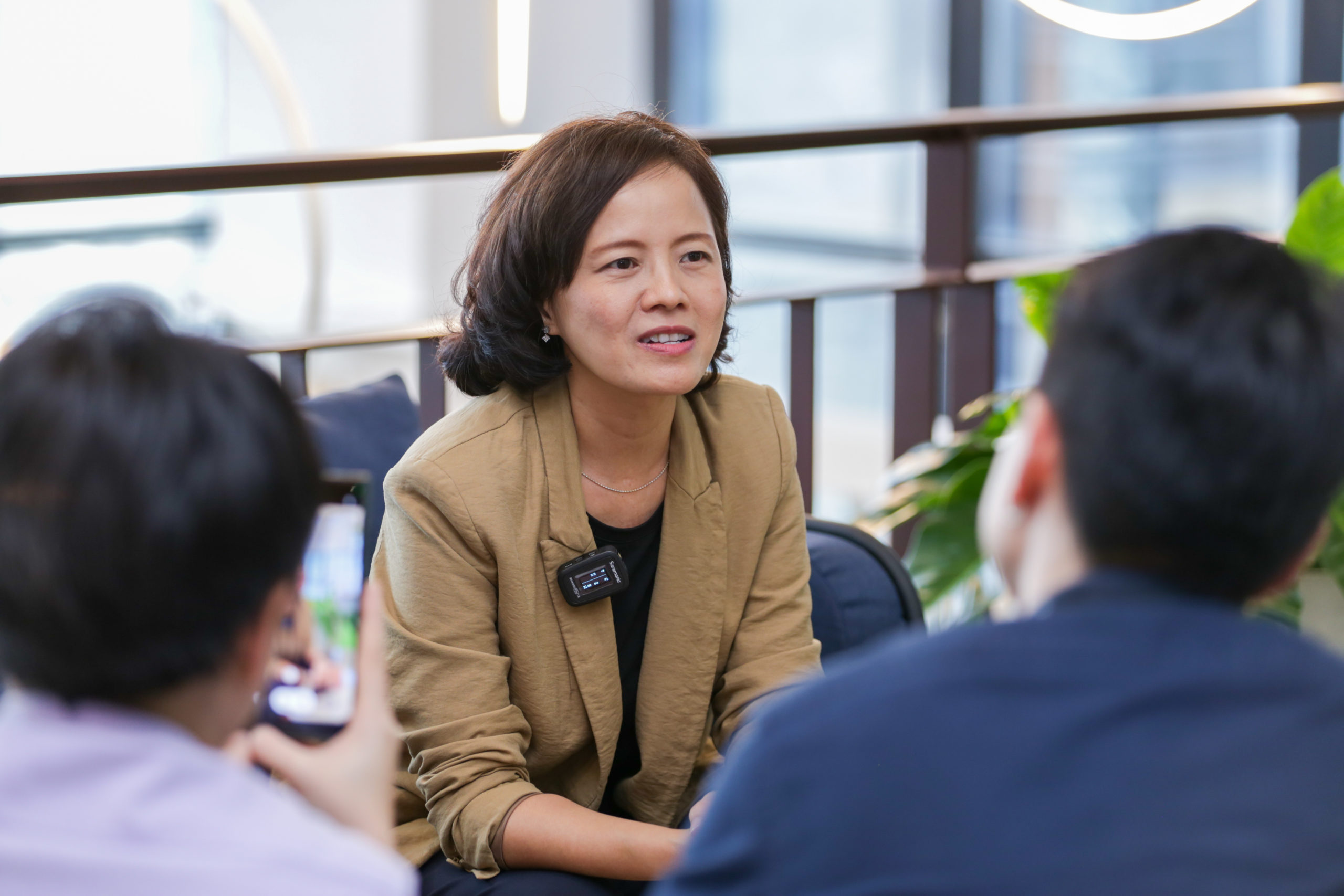The telecommunications industry operates within a framework of extensive regulations and encompasses multiple stakeholders in society. Serving as a critical infrastructure, connectivity plays a vital role in enabling access to essential services and driving economic growth and social development. To promote sustainable growth within the industry, telecom operators need to work closely with regulators and other stakeholders to foster mutual understanding and establish shared goals.
True Blog sits down with Kanokporn Kunchaicharoenkul, Head of Regulatory Strategy at True Corporation, to delve into the regulatory landscape of the telecommunications industry, her valuable insights from her two-decade experience in the field, as well as her work and life philosophy.

Understanding the World Order
Ms. Kanokporn graduated with a degree in electrical engineering (majored in electronics) from King Mongkut’s Institute of Technology Ladkrabang in 1992. Two years into her career, she was awarded a scholarship by the Thai government to pursue a master’s degree in electrical engineering at Virginia Tech, during the time when cellular communication was gaining popularity. After completing her studies, Ms. Kanokporn returned to Thailand and joined the Post and Telegraph Department, which operated under the Ministry of Transport and Communications.
“At the Post and Telegraph Department, our duty was on governing the spectrum management for different categories of radiocommunication services in Thailand. My responsibility focused particularly in affairs related to satellite communication. This provided me with a valuable opportunity to acquire knowledge in regulatory principles and mechanisms to manage the radio frequencies and geostationary-satellite orbit, which are considered limited natural resources,” she says. “These rules and regulations are regarded as integral to the world order.”
Ms. Kanokporn had several opportunities to represent Thailand as part of the group of technical experts of the International Telecommunication Union (ITU) at the conferences held in Geneva, Switzerland, contributing to the improvement of the plan for broadcast satellite services. As a specialized agency of the United Nations, the ITU is responsible for developing universal rules, regulations, and standards for radio communication and telecommunications. Member states frequently draw on the ITU’s guidelines and standards when formulating regulations for the telecommunications sector within their own countries.
“The ITU serves as an international regulatory agency for telecommunications,” Ms. Kanokporn says. “In those conferences, I came to realize that the process of drafting rules and regulations could be quite extensive. It often took longer than three days of debate to draft just a single page. While it was challenging for me as a junior professional traveling alone, it provided a valuable opportunity to learn from counterparts representing various countries.”
The Pursuit of Equilibrium
In the past, telecommunications in Thailand, much like other essential public services such as electricity and waterworks, were primarily provided by the government due to their importance in serving the public. However, the telecommunications industry underwent dramatic development brought about by globalization in the late 20th century. Thailand, as a member of the World Trade Organization (WTO), thus had to inevitably adopt the changing global regulatory regime to promote the liberalization in the telecommunications sector. This led to the enactment of legislation that established an independent regulatory body and fostered the level playing field for fair competition. As part of this transition, Thailand shifted from a concession system to a licensing regime, with the objective to encourage competition among private operators and ensure equal access to reliable and efficient telecommunications services for consumers.
During this transformative period, the Act on the Organizations to Assign Radio-frequency Spectrum and to Regulate the Broadcasting, Television Broadcasting and Telecommunication Services B.E. 2543 (2000) came into effect. As a result, the Post and Telegraph Department was abolished and its responsibilities were transferred to the Office of the National Telecommunications Commission (NTC), which is the equivalent of the present-day National Broadcasting and Telecommunications Commission (NBTC).
Afterward, Ms. Kanokporn joined Siemens during a period when several prominent telecom equipment vendors, such as Nokia, Motorola, Alcatel, Lucent, and Siemens, were thriving. Later on, she made a career shift to TA Orange (Truemove H today) as a regulatory compliance analyst, and she has remained with True Corporation ever since.
As a telecom operator, we have to approach laws and regulations from the standpoint of an entity being regulated. Our approach begins with understanding the intent of the regulator, which is centered around promoting efficient spectrum and other national telecom resource utilization as well as fostering fair competition. Ultimately, the goal is to provide consumers with access to reliable services at reasonable prices.
“While this represents an ideal scenario, the reality is more complex and intricate. As an operator, we need to carefully interpret the objectives of each regulation and understand how to implement it in practice, considering its implications on our business.”
As the Head of Regulatory Strategy, Ms. Kanokporn works closely with the regulator and several business units within the organization in order to establish a clear understanding of the laws and regulations pertaining to the telecommunications landscape and push forward for collaboration between the regulator and private sector to bring about balance and moderation for all relevant stakeholders in telecommunication industry.

Telecommunication industry is an essential component to support the development of economic and social systems. But to ensure a sustainable future, the private sector must have the capability to invest and develop their services. This is particularly significant for capital-intensive industries like telecommunications.
“The role of regulators should not be limited to mere regulation in a sense of control but should also encompass promoting development. Therefore, it presents a challenge for regulators and policymakers, as they need to design and implement laws that foster effectiveness, fairness, and stability in the market. They should find ways to strike the right balance between diverse interests with a holistic approach, rather than taking one side over the other. Achieving this equilibrium is not an easy task.”.
She continues, “It is both an opportunity and a challenge for those working in the regulatory field to make regulators aware of shifting trends and collaborate to drive the telecommunications industry forward with appropriate regulatory frameworks. By doing so, we can ensure that everyone progresses together.”
The Inward Journey
Throughout her career, Ms. Kanokporn has engaged with diverse individuals and learned about the outer world. However, she reached a point where she recognized her limited knowledge about her inner world. Being an avid reader and someone with a keen interest in exploring the deeper meaning of life, she developed a curiosity for Buddhism. Motivated by her quest for self-discovery, she dedicated eight years to studying the Abhidhamma (a scholastic systematization of the Theravāda school’s understanding of the highest Buddhist teachings) and obtained a degree in the subject from Abhidhamma Jyotika College, Mahachulalongkornrajavidyalaya University (MCU).
When discussing her work philosophy, Ms. Kanokporn highlights three fundamental principles that guide her: paying focused attention to her work, learning from experienced individuals, and maintaining mutual kindness with her colleagues. These principles embody the threefold training: moral conduct (sila), concentration (samadhi), and wisdom (panna), reflecting her simple yet profound approach to work.
“Paying focused attention at work or ‘tung jai’ (having one’s heart in the right place) originates from the Pali language manopubbangama dhamma, meaning that ‘Mind is the forerunner of all things’. When you undertake any task, it is essential to put your mind to it. However, in order to achieve success, you also need expertise and knowledge, which can be gained by learning from experienced people and a vast repository of knowledge,” Ms. Kanokporn says.
“While maintaining mutual kindness with your colleagues can mean supporting one another and being considerate by not expressing the negative emotion physically or verbally to them. This creates an environment where others feel psychologically safe around us, fostering a positive work environment.”
Ms. Kanokporn strongly believes that striking a work-life balance goes beyond mere separation of work and personal life. Recognizing that work takes up a considerable portion of our time, she emphasizes the importance of organizing and prioritizing one’s personal life.

Working on regulations for many years has taught me a piece of wisdom. We should cultivate self-disciplined lives, including personal, work and financial aspects. When our inner lives are in chaos, it’s difficult to have positive energy to handle external challenges. So, it’s important to live in a well-ordered way.
For example, by maintaining healthy eating and sleeping habits. These seemingly basic actions nourish our bodies and help our minds become more resilient, patient, and less easily agitated. As we organize our lives, our mood naturally improves, enabling us to see things with greater clarity, both internally and externally.”

Throughout her career, Ms. Kanokporn has worked on many challenging projects, such as spectrum auctions for mobile services, the high-speed rail project, the U-Tapao airport development project, and the True-dtac amalgamation. She believes that success is not achievable without teamwork and collaborative effort.”As a leader, I simply take the front seat and act as a representative of the team, managing, coordinating, and facilitating communication to ensure effective collaboration and progress. However, we cannot accomplish anything significant by working in isolation. We’re better together,” she continues. “When working together or forming partnerships, the initial stages can be tough and demanding. It is crucial to maintain open communication, leverage each other’s strengths, and be willing to compromise. With the collective good will of all involved, we can move from a state of compromise to a state of harmonization, where everyone’s contributions align and work in synergy.”




